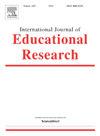Targeted assessment of hypothesis testing skills using cognitive diagnostic models: Implications for formative practice
IF 2.5
3区 教育学
Q1 EDUCATION & EDUCATIONAL RESEARCH
引用次数: 0
Abstract
Formative assessment is essential for identifying student learning gaps and supporting meaningful feedback, particularly in subjects that require multi-step reasoning such as statistical hypothesis testing. This study demonstrates how Cognitive Diagnostic Models (CDMs) can enhance assessment practices by offering detailed, attribute-level feedback on student proficiency. Analyzing item response data from 219 undergraduate students in an introductory statistics course, the study employed the Generalized DINA model and its reduced variants, identifying the most suitable and interpretable model. Through expert evaluation and Q-matrix validation procedures, four attributes involved in hypothesis testing were specified and refined. Among the six models, the Linear Logistic Model (LLM) yielded the best fit.The attribute classification results revealed that while most students mastered procedural aspects of hypothesistesting, distinct groups struggled either with selecting appropriate statistical methods or managing multi-step computations. The study underscores the potential of CDM-based assessments to provide actionable diagnostic information for tailored instruction, targeted feedback, and pinpointing specific learning hurdles. While this approach is readily applicable in large classes, its effectiveness can also extend to smaller groups by aggregating data across multiple cohorts. CDMs offer a flexible and scalable framework for improving assessment-for-learning practices across structured subject areas.
使用认知诊断模型的假设检验技能的目标评估:对形成性实践的影响
形成性评估对于确定学生的学习差距和支持有意义的反馈至关重要,特别是在需要多步骤推理的科目中,如统计假设检验。本研究展示了认知诊断模型(CDMs)如何通过对学生熟练程度提供详细的属性级反馈来增强评估实践。通过对219名统计学入门课程本科生的项目回答数据进行分析,采用广义DINA模型及其简化变量,找出最适合的、可解释的模型。通过专家评价和q矩阵验证程序,指定和细化了假设检验中涉及的四个属性。在六个模型中,线性Logistic模型(LLM)的拟合效果最好。属性分类结果显示,虽然大多数学生掌握了假设检验的程序方面,但不同的群体在选择适当的统计方法或管理多步计算方面挣扎。该研究强调了基于cdm的评估的潜力,为量身定制的指导、有针对性的反馈和确定具体的学习障碍提供可操作的诊断信息。虽然这种方法很容易适用于大班,但它的有效性也可以通过跨多个队列聚合数据扩展到较小的组。cdm提供了一个灵活且可伸缩的框架,用于改进跨结构化学科领域的学习评估实践。
本文章由计算机程序翻译,如有差异,请以英文原文为准。
求助全文
约1分钟内获得全文
求助全文
来源期刊

International Journal of Educational Research
EDUCATION & EDUCATIONAL RESEARCH-
CiteScore
6.20
自引率
3.10%
发文量
141
审稿时长
21 days
期刊介绍:
The International Journal of Educational Research publishes regular papers and special issues on specific topics of interest to international audiences of educational researchers. Examples of recent Special Issues published in the journal illustrate the breadth of topics that have be included in the journal: Students Perspectives on Learning Environments, Social, Motivational and Emotional Aspects of Learning Disabilities, Epistemological Beliefs and Domain, Analyzing Mathematics Classroom Cultures and Practices, and Music Education: A site for collaborative creativity.
 求助内容:
求助内容: 应助结果提醒方式:
应助结果提醒方式:


